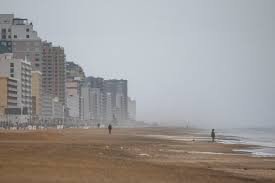
Tropical Storm Ophelia has made a tumultuous landfall on the coast of North Carolina, battering coastal areas with destructive winds and surges of water. The U.S. National Hurricane Center confirmed that Ophelia’s center reached the shore near Emerald Isle at approximately 6:15 a.m., with maximum sustained winds reaching 70 mph (110 kph). This location is roughly 25 miles (40 kilometers) west of Cape Lookout.
Threat of Life-Threatening Flooding
Tropical Storm Ophelia has brought an ominous threat of life-threatening flooding to parts of eastern North Carolina and southeastern Virginia. While the system is expected to weaken after making landfall, the potential for heavy rain and surges remains significant.
Ophelia is forecasted to turn north on Saturday and then shift northeast on Sunday, unleashing a weekend of windy conditions and torrential rainfall. Some areas in North Carolina and Virginia could see up to 7 inches (18 centimeters) of rain, while the mid-Atlantic region may experience 2 to 4 inches (5 to 10 centimeters) of rainfall through Sunday.
Warnings and Preparations
A storm surge warning is in effect from Bogue Inlet, North Carolina, to Chincoteague, Virginia, signifying the danger posed by rising ocean water pushed inland by Ophelia. Surges between 4 and 6 feet (1.2 and 1.8 meters) are anticipated in certain areas.
To address the imminent threat, a tropical storm warning has been issued from Cape Fear, North Carolina, to Fenwick Island, Delaware. Furthermore, a hurricane watch is in effect in North Carolina for the area north of Surf City to Ocracoke Inlet.
In response to the storm’s potential impact, the governors of North Carolina, Virginia, and Maryland declared a state of emergency on Friday. Several schools closed early, and numerous weekend events were canceled. Additionally, the Nationals baseball team in Washington postponed its Saturday game until Sunday.
Government Measures and Public Preparedness
Governor Roy Cooper of North Carolina issued the declaration of emergency to expedite preparations and provide a swift response. The North Carolina Ferry System has temporarily suspended service on all routes until conditions improve.
Governor Glenn Youngkin of Virginia stated that the emergency declaration aims “to ensure that all communities, particularly those with the greatest anticipated impact, have the resources they need.” He urged residents to prepare emergency kits and closely monitor weather forecasts.
Maryland Governor Wes Moore anticipated an extended period of strong winds, heavy rainfall, and elevated tides.
Community Precautions
Residents in vulnerable areas are taking precautions to protect their properties from potential flooding. Nancy Shoemaker and her husband Bob in Annapolis, Maryland, obtained sandbags to guard against surges, recalling their experience during a storm last October.
In Annapolis, water taxi service has been suspended for Saturday to ensure passenger safety and prevent vessel damage.
Dave Swain from Havre de Grace, Maryland, chose to secure his boat in Annapolis and was prepared to weather the storm. Swain emphasized the importance of proper mooring and safety measures in anticipation of potential dockside damage.
Natural Phenomenon and Climate Change
As Hurricane Center Director Michael Brennan noted, it is not uncommon for one or two tropical storms, or even hurricanes, to develop off the East Coast each year. These events often occur during the peak of hurricane season and can have significant impacts.
Scientists have also pointed out that climate change may lead to an increase in hurricanes reaching mid-latitude regions more frequently. This change in tropical cyclone tracks could make storms like this month’s Hurricane Lee more common and pose challenges for coastal communities.

